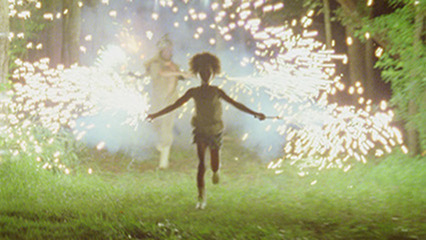

By Kim Voynar Voynar@moviecitynews.com
Sundance Review: Beasts of the Southern Wild
Beasts of the Southern Wild, directed by Behn Zeitlin and made by Court 13, the New Orleans-based filmmaking collective of which he’s a part, is a fabulous piece of cinematic storytelling. The story itself is fascinating, intricate, and completely unique: The protagonist is Hushpuppy, a six-year-old girl who lives a free and wild existence in The Bathtub, an isolated Bayou community physically and symbolically cut off from the rest of the world by the levee. Hushpuppy lives with her wild-man father and the pack of lovable, independent miscreants who’ve carved out their own way of life in this singularly unique place; school in The Bathtub is where the ragtag pack of kids who live there learn about survival and the value of independence.
Hushpuppy’s dad, Wink, leaves her on her own much of the time and even has her live in her own house (a decrepit trailer propped up on oil drums) across from his shack. Living immersed in the nature of the things around her has taught her that all things are interconnected, so when a hurricane hits, threatening the very way of life the residents of The Bathtub have come to value, and her father simultaneously gets very ill, Hushpuppy cannot help but think there is a connection between the two. This spirited, ferocious little girl has to call on all her resources to find a way to make it through.
This is bold, remarkable filmmaking – particularly so when you consider that this collaboration is Zeitlin’s first feature (his 2008 short, Glory at Sea, was also daring and imaginative). Beyond what it is as a film, as a project overall Beasts of the Southern Wild speaks to what can happen when artists collaborate together to create something bold and daring, with a daunting production design and an unconventional script. It also speaks to how the Sundance Labs and funding grants can help a project like this get made to begin with, so kudos really need to be distributed all the way around. In today’s tight funding climate, that a film of this scope was even made at all is pretty remarkable; this is the kind of film that, for me, epitomizes what the spirit of a fest like Sundance is all about.
Quvenzhané Wallis, the young actress who plays Hushpuppy, was just five when she auditioned for the part, and her fierce, fiery performance here is nothing short of fantastic. Dwight Henry, another non-actor (he’s a baker by trade) is equally great as the unstable father who shows his love by trying to teach Hushpuppy how to survive on her own. Zeitlin directs his cast of non-professionals in a naturalistic style that, particularly early in the film, almost feels like a documentary of these people and this way of life, albeit one narrated by a six-year-old girl.
The film veers further into the fantastical and symbolic as we go along, but none of it feels superfluous. Every moment of this story drives Hushpuppy along the path of she needs to go down to be able to survive, whether the world makes her an orphan, melts glaciers, or confronts her with ancient, thawed beasts; it’s a fantastical journey tale, a coming-of-age tale, and a hero tale all spun together delightfully, making Beasts of the Southern Wild one of the most original, inventive and compelling films I’ve seen at Sundance not just this year, but all the years I’ve been coming here. This is the kind of gem for which I’d sit through countless more mundane films just hoping to come across. What a lovely, brilliant piece of filmmaking.















